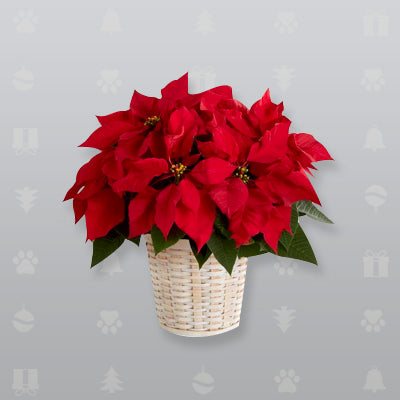
How Should You Care For Your Pet During the Holidays?
September 22, 2021 5 min read
It’s that time of year again: the holidays. Although the winter holiday is the most wonderful time of the year for humans, it can be a stressful and dangerous time for our four-legged family members. From unhealthy holiday treats to shiny Christmas decorations, the holiday season brings tons of risky temptations for animals. And of course, nothing can spoil the holiday mood like a visit to the emergency vet.
We’ve rounded up a list of holiday pet safety tips for you to keep in mind, especially if you have a kitten, puppy, newly adopted animal, or pet that is prone to be anxious about being around crowds or noises.
There's a lot to consider this year, so it is wise to pay attention to these ideas to make sure your furry friends have the best holiday season possible.
1. Pet-Proof The Christmas Tree

Animals love to sleep under the Christmas tree - and you don’t want your tree tipping over onto them! To avoid a dangerous tree-tipping disaster, securing it to a wall or ceiling with a fishing line can help keep it upright. Besides, pets love jumping on trees, so make sure that the base is solid and stable enough to hold the Christmas tree in place all season long.
2. Be Careful With Christmas Decorations

Some Christmas decorations such as baubles, ribbons, electric lights, and ornaments can be harmful to your pets. During the Christmas holidays, don’t forget to keep an eye on your pets to prevent them from chewing or biting anything they shouldn’t. You can hang all your Christmas tree decorations out of your paws reach or place a pet gate around the Christmas tree to stop your pets from getting close to it.
3. Avoid Dangerous Christmas Plants

During the holidays, plants play an important role in festive decorations. However, popular winter plants such as holly, mistletoe, and poinsettia can be extremely toxic for dogs and cats if ingested. If you decide to bring any of these plants into your home, be very careful about where you are putting them and how to keep them out of reach of animals.
4. Keep Gifts And Candy Out Of Reach

Because pets are naturally curious, you should make sure all of your festive stuff like toys, candy, and other gifts are kept out of reach at all times. If you believe your pet has gotten into something they shouldn’t have this holiday season, contact your vet instantly. You can also call the pet poison control hotline at (888) 426-4435 for immediate information and help.
5. Beware Christmas Tree Water

When putting a real tree for the Christmas season, preservatives like pesticides and fertilizer water additives can be found in the tree's water reservoir. Your pets may mistake this for a bowl and drinking from it can result in stomach issues that may poison them. With curious furry members in the house, always limit access and cover the water supply.
6. Avoid Holiday Food Dangers

Typical holiday foods like xylitol, poultry bones, alcohol, nuts, turkey skin, and chocolate contain ingredients that present very real dangers to your pets. So, it’s important to keep any of these foods well away from your cats and dogs and do not leave them unattended. If your pet is seen eating anything toxic or has any unusual signs, call your vet asap to reduce the chances of serious health issues.
7. Have Some Pet-Safe House Rules

Make sure your guests know what they can or cannot do around your pets during the holiday gathering. Consider establishing a list of clear house rules to make the holiday or dinner enjoyable for guests and your pets. Once you have made your list, the rules should be followed clearly, fairly, and consistently to keep your pets safe during the festive season.
8. Give Your Pet A Space Of Their Own

Give your furry friends a room of their own to sneak into and you will no longer have to worry about them seeking refuge where they don't belong. Include a comfy bed or crate, personalized food, water bowls, and several favorite toys. This is great for shy pups and cats who are still potty training, prone to anxious chewing or digging.
9. Avoid Holiday Noise

Noise can terrify pets and cause possible damages to their sensitive ears. Many pets are afraid of fireworks and tend to go missing on New Year's Eve more than almost any other night of the year. The pets who fear fireworks can exhibit several signs such as shaking, hypersalivation, excessive barking, so be sure to secure them in a safe and quiet place with a comfortable hiding place as midnight approaches.
10. Holiday Blues

The holiday break can be a great chance to escape on a holiday. But if you’re away this Christmas, don't leave your pet for too long – the fur babies deserve the love and a reliable routine to feel secure. Make sure you spend some time caring for your pets, and a bit of one-on-one time will help you both unwind from the sorrowful emotions this time of year.
11. Keep Pet Emergency Numbers On Hand

Stress can cause pets to behave in unpredictable ways. In case of a swallowed ornament or the odd bump or injury, ensure that important phone numbers like those of your vet, after-hours emergency veterinary clinic, and Animal Poison Control are on hand so you can easily call. Call the ASPCA Animal Poison Control Center at (888) 426-4435 or you can visit their website at www.aspca.org/apcc.
12. Consider Pet Daycare Or Professional Pet Sitting Service

If you’re not sure what to do with your pets over Christmas vacation, consider a doggie daycare or a professional pet sitter. If you think your pets will be most comfortable in their own space, find local pet sitters and dog walkers to visit them throughout the day for walking, feeding, and going to the bathroom. If your pets are outgoing and enjoy socializing with other furry pals, opt for doggie daycare.
13. Christmas Pet Costumes

If you’re like a lot of pet owners, finding awesome Christmas sweaters for your pets is much more thrilling than finding your own. Although the costumes look cute, your pets may not agree. In case they aren’t into dressing up, it’s best to let them be themselves over the holidays. However, if they have the patience and don’t mind an occasional fashion show, go for it!
14. Protect Your Pets In Cold Weather

Despite having fur all over, dogs, cats, rabbits, and other small pets do get cold. Low temperature can cause itchy and flaky skin – so the warmer your pets are, the less discomfort they will feel. De-icing products like rock salt, grit, and spray contain chemicals - causing irritation and cracked paws, so always remember to wipe their paws with a cloth and warm water as soon as you get home.
15. Feed Your Pets Well
Although animals may appear to slow down during the winter season, they usually need more food to generate more body heat and keep them warm. Just make sure you monitor their food consumption and discuss their nutritional requirements with your vet. Additionally, always keep the dog treats at a bare minimum because these contain calories that can cause weight gain.
Wrapping Up
Thanksgiving, Hanukkah, and Christmas may be the most wonderful times of the year, but they can also present a lot of risks to our beloved furry family members. The holiday season is upon us once again – and hopefully, these pet safety tips can help Christmas with your pets go smoothly and make it your pet’s safest and merriest Christmas yet.

